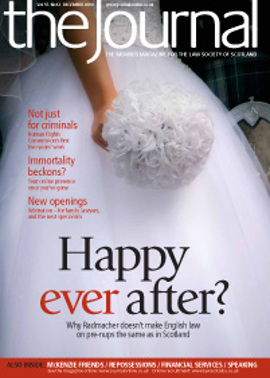Creating a jigsaw

In June 2007 the Cabinet Secretary for Rural Affairs asked the Tenant Farming Forum (TFF) to investigate perceived barriers facing new entrants into the farming industry, identify practical solutions and make recommendations.
TFF is an independent body whose primary purpose is to help promote a healthy tenanted farming sector in Scotland, counting among its members the Scottish Tenant Farmers Association, Scottish Rural Property Business Association and National Farmers Union of Scotland.
TFF immediately launched its consultation, publishing its recommendations in March 2008. Since then, TFF has had a series of meetings at which, inter alia, proposals for changes to the Agricultural Holdings (Scotland) Acts were discussed, with a view to encouraging the release of more land on to the letting market.
In due course, TFF recommended a package of measures designed to remove or reduce some of the burdens imposed on landlords and tenants by the legislation, and to encourage the availability of more land by enhancing the confidence and security of both interest groups.
Some of the package is now embodied in the Draft Public Service Reform (Agricultural Holdings) (Scotland) Order 2011, proposed to be made under s 17 of the Public Services Reform (Scotland) Act 2010. This procedure, which is being used for the first time, involves a formal consultation process as part of which a copy of the proposed order and an explanatory document are laid before Parliament. Once consultation responses have been accounted for, the draft order is to be laid for approval by resolution of the Scottish Parliament. This procedure is designed to avoid primary legislation.
The draft explanatory document is long, repetitive, and substantive only in small parts! The draft order proposes six amendments to the Acts.
2003 Act
- Section 5 – to reduce the minimum period of a limited duration tenancy (LDT) from 15 to 10 years.
- Section 5 – to provide for a short limited duration tenancy (SLDT) to be converted to LDT, either by express agreement or impliedly by consent, the tenancy having effect as if it were for 10 years from the commencement of the SLDT – i.e. the SLDT is merged into the LDT.
- Section 16 – to reduce the burden on landlords in relation to fixed equipment by reducing their liability to providing at commencement only such equipment as is required having regard to the purposes of the lease and (except where the lease is of bare land) for that fixed equipment to be entered into a schedule specifying its condition, forming part of the lease. Note that other provisions of s 16 regarding replacement, renewal and maintenance of fixed equipment are unaltered.
1991 Act
- Schedule 2 (grounds for consent to the operation of a notice to quit where s 25(3) applies) – to change “two-man unit” to “viable unit”, a unit capable of providing the occupier with full-time employment plus the means to pay the rent and to pay for adequate maintenance of the land.
- Section 5(4)(b) – to provide for post-lease agreements to be annulled on the same date at which a rent review (whether statutory or under the lease) becomes effective.
- Section 13 – to restore the requirement to give notice of a rent review (omitted from the 2003 Act when s 13 was amended).
Omissions and submissions
Unfortunately, for one reason or another, the Scottish Government has omitted to include in the draft order other measures which were agreed in TFF as part of the “package”, viz:
- to prohibit landlord only/upwards only rent reviews;
- to include grandchildren in the definition of “near relative” for the purposes of s 25 and in sched 2;
- to clarify whether a change in VAT constitutes a review of rent such as to interrupt the three-yearly cycle (following the confusion caused by Mason v Boscawen).
The Scottish Government is now proposing an Agricultural Holdings (Amendment) (Scotland) Act to effect these changes.
Whether these changes, even when they are all effected, will encourage landlords to let more land remains to be seen, although I rather doubt it. The reduction of the minimum term of LDT and the less draconian obligations regarding fixed equipment will no doubt help, although the proposed revisals to s 16 are not all that clear. Discussions are, however, taking place with a view to making them more workable. What is certain is that, in due course, ascertaining the law on agricultural holdings will be like piecing together a jigsaw puzzle. It is crying out for consolidation, at least, if not the major and fundamental reform which I for one think is required.
Alasdair G Fox, consultant, Anderson Strathern LLP
In this issue
- Guidance on evidential requirements for salmon fishing titles
- The problem of drug misuse: the Portuguese alternative
- Winter wondering
- Targeting best value
- Wedded to the pact?
- Human = people
- Fee changes in New Year
- Choosing friends
- Digital death
- Evolution or revolution?
- Agreeing to disagree
- Commercial sense
- Justice: the election target
- Law reform update
- Roadshows bring in hundreds
- Save our system
- Gill moves a step closer
- Member benefits grow
- Ask Ash
- Social media - Trojan horse?
- Speaking legally
- Setting your priorities
- Problems of definition
- A fishy business
- Creating a jigsaw
- One size fits all?
- Scottish Solicitors' Discipline Tribunal
- Website review
- Book reviews
- Climate change, culture change
- Default position
- Contaminated land guidance revised
- New and improved






